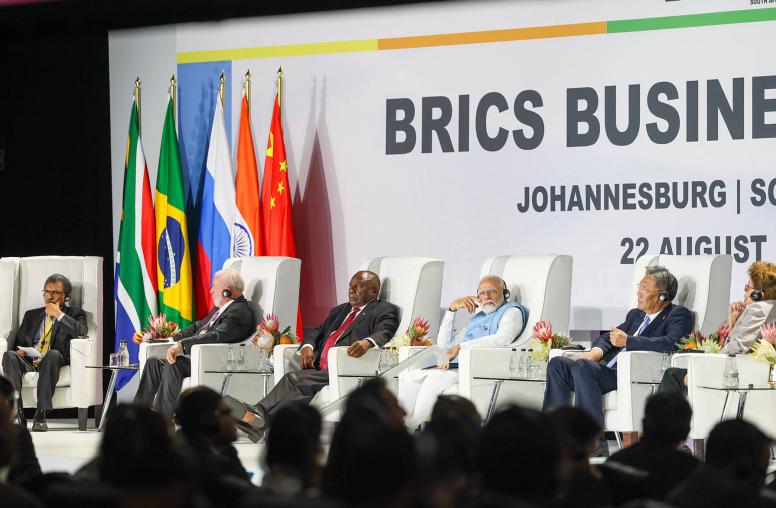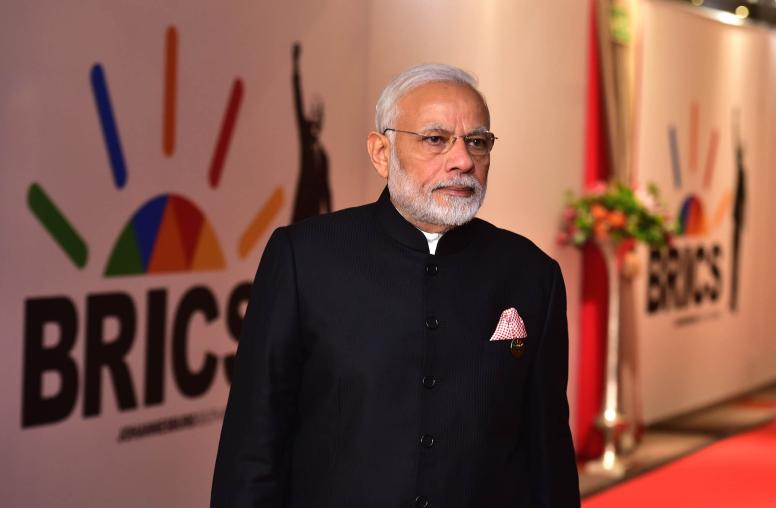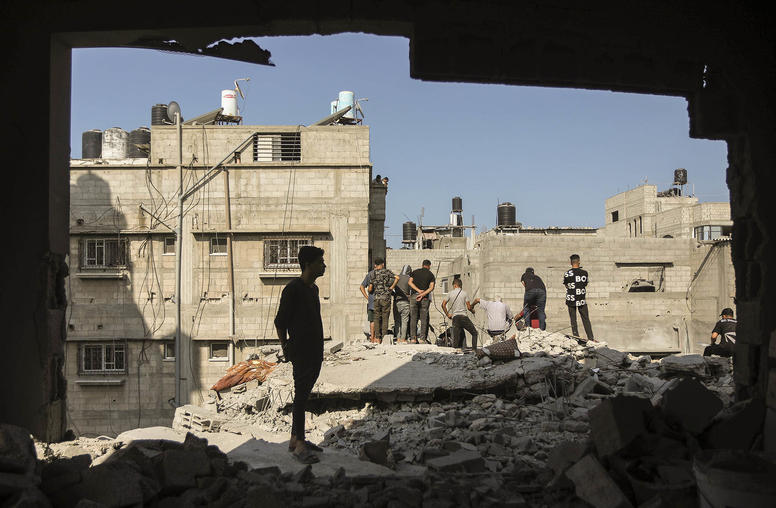Lavrov in Latin America: Russia’s Bid for a Multipolar World
As Russia tries to undermine U.S.-led order, Lavrov’s visit offers a glimpse into Moscow’s new foreign policy vision.
This past week, Russian Foreign Minister Sergey Lavrov completed a four-country tour of Latin America to reinforce Moscow’s alliances and foster growing partnerships in the region. During the trip, Lavrov met with the heads of state of Brazil, Venezuela, Nicaragua and Cuba in their respective countries, as well as another meeting with Bolivian emissaries during his stop in Venezuela. Lavrov used the opportunity to emphasize the key tenet of Russia’s newest foreign policy concept that was launched in the past month and is shared by regional powers like Brazil: The world is experiencing a revolution in which Western power is weakening and a new multipolar world is emerging.

USIP’s Kirk Randolph discusses what Russia and its Latin American partners gained from the tour, how the United States might respond to Lavrov’s visit, and what the implications are for broader Russian foreign policy goals.
What has Russia accomplished with Lavrov’s visit?
Lavrov’s tour was principally about strengthening relationships and building momentum behind Moscow’ concept of a multipolar world outside of the current U.S.-led liberal order typified by institutions like the IMF and NATO. The majority of the trip was spent with autocratic allies Venezuela, Nicaragua and Cuba, where Lavrov reinforced their regimes and condemned the United States for its ongoing sanctions against those states and their officials.
Lavrov worked to distinguish Russian engagement in Latin America by insisting that they do not want to create an “artificial dilemma: with us or against us” based on the position countries have taken on Russia’s invasion of Ukraine.
In fact, the opposite is true, as Lavrov attempted to use the war in Ukraine as a strategic wedge between the United States and its Latin American allies. He argued that by encouraging Latin American countries to distance themselves from Russia and support Ukraine, the United States was engaging in a form of bullying and imperialism.
The most important stop of the tour was Lavrov’s visit to Brazil. President Lula’s chief advisor and former foreign minister, Celso Amorim, visited Moscow last month, and both exchanges focused on the potential for Brazil to serve as a mediator for peace negotiations between Russia and Ukraine.
While Brazil voted in the U.N. to condemn Russian aggression, President Lula has made recent statements that both parties to the conflict are responsible for the war — a characterization contradicted both by Brazil’s prior stance and Russia’s unilateral invasion of Ukraine. Lavrov extended an invitation to Lula for an official state visit to Russia, which prompted the Ukrainians to follow up with an invitation of their own — welcoming Lula to see first-hand the destruction Russia had inflicted on Ukraine. President Lula has declined the invitation and, in his stead, will send Celso Amorim at a future date.
What have Russia’s Latin American partners gained from Lavrov’s visit?
No significant projects or agreements were announced during Lavrov’s tour. Statements focused on emphasizing Russia’s respect for Latin American countries’ sovereignty while highlighting areas for new and more robust cooperation between Russia and its partners to support Russia’s vision of Latin America as one of the emergent centers of the multipolar world.
In Brazil, Lavrov celebrated the two countries’ trade relationship and indicated they are working on building out more extensive economic cooperation across multiple sectors, including agriculture, nuclear power and pharmaceuticals. Russia is likely seeking to rebuild supply chains that were disrupted by Western sanctions by engaging in the ongoing global trend of “friendshoring,” which is the strategy of insulating economies from disruptions by consolidating critical supply chains in allied countries.
In Venezuela, Lavrov built on Russia’s aspirations for new supply chains in Latin America by reiterating earlier commitments to revive the ministerial dialogue mechanism between Russia and the Community of Latin American and Caribbean States, a regional bloc of countries notable for its inclusion of frequently excluded countries like Venezuela and Cuba. He also spoke to Russia’s belief that Russia and their partners are creating a “critical mass of ideas” for solving global problems outside the confines of Western debate and institutions, citing support for de-dollarization and BRICS — the acronym for the economic cooperation bloc made up of Brazil, Russia, India, China and South Africa.
In Nicaragua, Lavrov celebrated the two countries’ landmark agreement for the peaceful use of atomic energy signed back on March 29 — a notable development in an alliance characterized by ongoing economic and security integration based on agreements signed in 2022. Lavrov also pointed out that a Nicaraguan delegation would be participating in Russia’s upcoming St. Petersburg Forum meant to attract business to Russia, as well as participating in a Russia-Latin America interparliamentary conference with the Russian State Duma later this year.
Meanwhile, the Russia-Cuba alliance remains stronger than ever as Lavrov announced that Cuba’s Russian-held debt had been restructured and that discussions had progressed on the supply of fuel and food to the island.
What does Lavrov’s visit to Brazil reveal about BRICS coordination?
Coordination among BRICS countries continues to deepen in the face of the West’s efforts to politically and economically isolate Russia. Lavrov’s arrival in Brazil followed on the heels of Lula’s weeklong visit to China, during which former Brazilian President Dilma Rousseff was sworn in as the new president of the BRICS-funded New Development Bank based in Shanghai. Analysts have identified “circumventing the geopolitical impact of Western retaliations against Russia” as one of the top two challenges for the bank going forward.
Within Latin America, Uruguay is poised to join the group, while Nicaragua and Argentina have expressed interest in joining BRICS in advance of the group’s upcoming summit in June.
In addition to BRICS economic cooperation, President Lula has put forth a peace proposal calling for a G20-like group that would include all of the BRICS nations to negotiate a peaceful conclusion to the ongoing war in Ukraine.
This foray onto the broader international stage reflects a slightly disjointed approach to the war among BRICS member states, as fellow member China has also made its own overtures as a potential mediator. The two approaches aren’t necessarily in competition, as Lula’s interest in inserting himself into the conflict appears to be grounded in his own desire to cement a legacy as a generational senior statesman. Beijing, on the other hand, is likely to take a more conservative approach, allowing Lula to act as the more public-facing advocate for a negotiated settlement while China maneuvers behind the scenes. This would offer China a chance to distance themselves from any failed efforts or claim credit for any potential successes. For the time being though, neither approach has a serious chance and both are more posture than serious proposal.
India continues to remain determinedly vague on Ukraine, committing itself only to supporting a peaceful resolution, while South Africa is currently sowing confusion on the international stage as the country’s president, Cyril Ramaphosa, declared they would be withdrawing from the ICC. His office has since walked back the statement, so it remains unclear whether Putin will be able to attend the upcoming BRICS summit in South Africa given the outstanding ICC warrant for his arrest.
How does this affect U.S. policy toward Latin America?
Russia’s principal interest in Latin America is political. It aims to influence the region so that it can chart a global path that is impervious to U.S. influence.
Russia itself has neither the resources nor the bandwidth to become a major partner in Latin America capable of competing with U.S. investment. However, the arguments Russia makes for multipolarity resonate within the region and can ultimately influence countries away from the United States even if the alternative ends up being China rather than Russia.
Displacement of U.S. influence is not as straightforward as Russia or others make it seem, though, given the deep economic, cultural and familial ties between the region and the United States. U.S. policy is now presented with a twofold challenge: First, how does the United States adjust policy toward middle powers like Brazil to be more inclusive and patient? And second, how does the United States help strengthen regional democracies so they can better deliver on the issues citizens care about — particularly in the face of growing autocratic securitization models that are accelerating democratic backsliding in the region?
The United States needs to pivot away from treating middle-power allies in Latin America and elsewhere as part of a patronage network and instead engage with them as meaningful partners. In the case of Brazil, Lula seeks a multipolar world and is not afraid to use Ukraine as a way to reinforce the current trend toward a less one-sided global balance of power. But the United States should stress to Lula that independence means independence, and he should not fall under the sway of others as he seeks to chart a course away from the United States.
Lula is also faced with challenging regional and domestic problems, like inequality, environmental degradation and a deeply polarized and charged political environment in Brazil. Rather than setting up an all-or-nothing approach to get Lula to align or shift toward a particular side on an issue, the United States should build on the depth of its bilateral relationship to focus on regional and bilateral issues of mutual concern that will resonate broadly with the Brazilian people. This could then buy the United States more space when it engages on issues pertaining to Ukraine, China and Russia.
Meanwhile, there are other topics, like Venezuela, where Brazil’s influence and its independence from the United States, China and Russia could be helpful to a solution. Lula’s support for democratic norms is important in both setting an example and reinforcing democracy against the current wave of backsliding in the region.
Brazil also stands to gain from a stronger partnership, as it requires assistance in maturing as a regional power. The world has changed since Lula was last in power, he cannot simply declare himself as the principal representative for the region. He has to work inclusively with other Latin American governments to provide regional public goods and to act as a mediator in regional conflicts. After years of political turmoil and the country’s most recent isolationist president, Brazil has a capacity gap in being able to fill that void. The United States can act as a key ally in helping Brazil fulfil its regional ambitions.
The United States, due to its complex history of involvement in Latin America, is often viewed with skepticism — particularly when it tries to raise earnest concerns about the autocratic influence of countries like China and Russia in the region. The United States needs a partner like Lula, whose voice carries weight within the region when speaking out against autocratic behavior due to his own personal fight against military rule in Brazil.
U.S. outreach and an effort to build a more collaborative foreign policy in Latin America does not guarantee acceptance or success, but the invitation in and of itself represents progress. The democratic leadership of Brazil has called for a more inclusive and representative voice in the region. And as a defender and promoter of democratic norms, the United States has a vested interest in responding to that call.
Kirk Randolph is a program officer with USIP’s Latin America program.



